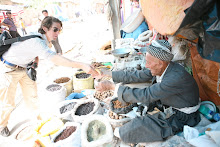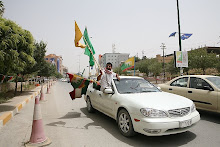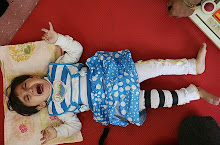Confusion reigned today as anti Ghadaffi forces were again pushed back from the front line near Brega. Scenes from the battle leave little doubt that this rag tag group of men are ill-equipped and at present, incapable of taking on the well armed and better organised enemy on their own. Today also illustrated perfectly the issues facing the rebels, and as I watched their repeated attempts to push back enemy troops, it was clear that they are a long way from swaying the balance of power in their favour.
Not only are a number of men armed with the most antiquated weapons, and in some cases even knives, but there is also basic lack of communication between troops, indeed it soon became clear that the soldiers waiting with us to move forward knew no more than we did.
As I watched these men, varying in age from 17 to 50, I was struck once again at how little they know of warfare. Held back about 7 miles from the front line I watched truck after truck retreat while they struggled to reload their heavy calibre weapons, many of them arguing and screaming at each another as they did so. There was an incredible sense of confusion and moral is at a new low; for there have been no recent victories and hope for a fast win faded long ago.
We were about 70 miles from Benghazi, where we are currently staying and today was supposed to be the final push from Ajdabiya to Brega. This has been the front line for almost a week but with NATO’s help this was supposed to change. The mood was jubilant as we rode forward with the tanks and missile batteries but it was not to last.
Having been kept some miles back from the front with the second wave of troops, we waited patiently to move forward. We were in earshot of heavy shelling but the mood still seemed positive. The day darkened suddenly though, when out of the dust ahead came scores of pickup trucks retreating at full speed. They brought with them news of NATO airstrikes hitting their own positions rather than Ghaddaffi’s, devastating their emplacements, their tanks and scattering their troops. It is the second time that NATO has attacked the wrong targets and 6 rebels have been reported dead with 15 injured.
Once again therefore NATO planes have mistakenly targeted rebel tanks, and in the eyes of the rebels NATO has become ever more unhelpful. There seems to be an underlying suggestion that if these mistakes continue, or if NATO does not attack Ghaddaffi soon, then there may be a serious and long-term backlash against the west. Many people now suggest that the west is trying to split the country in two, and that there is a hidden agenda that we cannot read. I must say that it is easy to understand this in a country that has been cut off from the world for the last 40 years, and whose children have been brainwashed with stories of foreign evils. There is so much distrust.
Immediately following news of this NATO mistake, anger on the front lines could barely be contained, and at times it felt as if it might be taken out on us. One man had lost his friend and as he pounded the truck and wept he cried out towards us before crumbling into a heap on the ground, embraced by those around him. The strangest thing though is that for every rebel who shouted and cried out in anger, there were others who could be seen clapping each other on the backs and smiling. For some it seems almost like a game, and there is a strange disconnect here between those have been carried away by the rebellion’s initial success and those who still hope to die for their cause.
The whole scene, as we waited in the desert heat surrounded by ragged Libyan fighters, all waiting for news from what was going on only a few miles ahead was incredibly surreal, but it was soon to feel a lot more real.
Only one thing was now agreed on by everybody; that Ghadaffi’s troops were moving ever closer to our position. So as more ambulances screamed past us to the front the situation became more and more tense. Guns could still be heard in the distance as we walked among the troops, when suddenly from nowhere the ground shook and the air reverberated as two mortars exploded just a few hundred metres away. There was a loud initial thud followed by a loud explosion and as the ground shook chaos erupted.
People leapt into every available vehicle and scattered. Hundreds of people were now running for their lives and as they sped past us, I could hear more cries of ‘NATO, NATO’. It took us what felt like an eternity to find our own car, and as I dashed backwards with my hands over my head (a rather pointless thing to do) I prayed desperately that there would be no more. We could hear jets overhead and other bombs in the distance but thankfully no more near us.
We regrouped about 20 miles down the road , but nobody could tell us what was happening or whether there would be a counter attack. Nobody knew who was in charge, and everybody was shouting; At us, at each other and at the sky. Most of the cars had just kept driving away anyway and the army had disbanded. Even if we had wanted to go back our driver refused while our translator was panicked. It was close enough for me, and being my first experience with real warfare I felt …….. As I sit here now my heart still races, but I would be nowhere else.
This chaotic picture from the front is repeated throughout the region and very clearly so in the rebel “stronghold” of Bengahzi. Despite the interim government’s insistence that only trained people can now fight it seems that anybody with a looted uniform can join the ranks. It seems that everybody is part of this ‘great movement’ though not many seem to be doing much. Anyone with a gun is more important still, and as the going rate of an AK is now $3500 that is no surprise.
I have seen many other things that point towards the problems being faced here and general lack of coherent plans for the future, if not among the leadership then certainly among the soldiers. Yesterday I saw a boy no older than 10 dressed in uniform and directing traffic, while nearby two Libyan men fought over a gun much as 2 children might a toy. The interim government acknowledges that the troops are badly trained and need help yet this is a massive understatement. Tomorrow I go to the training camps, and from what I hear these somewhat resemble the Afghan national police facilities.
I have met scores of Libyans from abroad who have flocked here for the chance to fight. Many of them go to gawp at Ghadaffi’s palaces or secret prisons, the shear horrors of what went on here only just dawning on them. Yet they come with a carnival atmosphere in mind and when faced with fighting shy away from the dangers around.
One 15 year old from Manchester is currently waiting for training, but like many others who believe they had already won this war he had never really expected to fight. He is just a boy, he is scared and he only wants to go home. I have told him he should and took him to the hospital with me to see the wounded. I hope it will help.
Everybody here has come to help but nobody knows how. Manu are so quick to talk about their experiences near the fighting and all show off bullets but they can do no real good. They blame the west for their past, they are blaming now for their present and will no doubt blaming them in the future. They blame the west for doing nothing or for trying to help. It has been hard work defending us.
I cannot deny the bravery or the commitment of most rebels, and this must never go unsaid. Initial stories of men sacrificing themselves to bring down the walls of gadaffi’s barracks and of becoming martyrs abound. They have fought against a tyrant with their bare hands, risen up against 40 years of oppression and many of them will readily to die for their cause. This is the greatest strength they have. They are also a kind, and welcoming people. They do not hate individual westerners but they all believe that we are being played by big evil governements. Most believe that 9/11 was surely an American conspiracy.
They know full well that in recent years the west turned a blind eye to Ghadaffi’s horrors to secure oil, and this is hard to deny.
There is also no denying the atrocities that Ghadaffi is committing now. When listening to stories from the besieged Misrata, many of which are terrifying, it is clear that the time has come for him to go, indeed it is long overdue. For this to happen though this revolution needs to find its feet and make its plans, but for the tide to turn the West needs to do more – whether it should, whether it can, and whether it will be allowed to are different questions.
This story is far from over, and this country will be mired with trouble for years. As people gather round tv sets each day and watch the action live, one cannot help but think they fail to not grasp the seriousness of their predicament, in the near future, and the far.
Saturday, 9 April 2011
Subscribe to:
Posts (Atom)














































